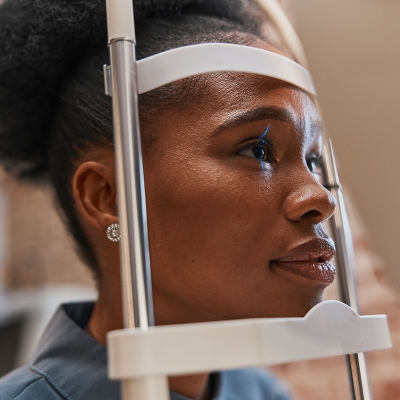Here’s how Medicare may cover eye care services for people with diabetes
Medicare doesn’t typically cover eye care. But there may be exceptions — including those for people with diabetes. Here’s what to know.

Diabetes may put people at a higher risk of certain health conditions, including ones that may cause vision damage or loss. That could include conditions such as age-related macular degeneration, cataracts or glaucoma.1
If someone has an Original Medicare or Medicare Advantage plan, they may be confused about whether they have vision coverage. It may also be difficult to understand what is actually covered.
Here are some ways Medicare may cover vision care needs for older adults with diabetes.
Looking for a new eye care provider? Search the UnitedHealthcare Vision Network now.
How to navigate Original Medicare and Medicare Advantage
Original Medicare includes hospital insurance (Part A) and medical insurance (Part B). While Original Medicare may not generally cover routine eye exams or glasses or contact lenses, it may cover eye care in limited cases.2
One of the exceptions is an annual comprehensive vision exam for people with diabetes, which screens for certain eye conditions. Medicare also pays for the treatment of certain eye conditions.
Medicare Advantage (MA), also called Medicare Part C, is a “bundled” plan from a private insurance company. MA includes:
- Hospital insurance (part A)
- Medical insurance (part B)
- Often prescription drug insurance (part D)
MA plans are required to include the same medical coverage as Original Medicare. Plans may also offer dental, hearing and vision insurance.
MA vision insurance typically covers annual routine eye exams, as well as prescription glasses and contacts. But it may not cover medical services that would otherwise be covered by Original Medicare. For example, Original Medicare may cover some preventive services, such as annual dilated eye exams for certain conditions such as diabetes.
For people with diabetes, here are ways Medicare may cover their vision care needs.
1. Diabetic retinopathy screening
An estimated 9.6 million people in the United States — 1 in 4 people with diabetes — have diabetic retinopathy (DR).3 DR may occur when high blood sugar levels damage blood vessels in the back of the eye. This may cause them to swell and leak, which may lead to blurry vision and vision loss.
Medicare coverage option: If a person has diabetes, Medicare Part B covers an eye exam by a state-authorized eye care provider to screen for diabetic retinopathy once each year.4
2. Glaucoma screening
A person with diabetes is at high risk of developing glaucoma. Older adults are also at high risk of developing glaucoma. Glaucoma is a progressive eye disease that damages the optic nerve. This damage causes vision loss over time and may lead to permanent blindness. Glaucoma usually has no symptoms, so it’s important for people who have an increased risk of it to get regular screenings.5
Medicare coverage option: For people with diabetes, Medicare Part B covers an eye exam by a state-authorized eye doctor to screen for glaucoma once each year.4
3. Cataract screening
Cataracts are the leading cause of vision loss in the United States.6 A cataract is clouding in the normally clear lens in the eyes. People with diabetes may be more likely to have cataracts and get them at a younger age.7 This may happen when unmanaged blood sugar causes deposits to build up on the lenses in one or both eyes. Older adults may also have an increased risk of developing cataracts.
Medicare coverage option: For people with diabetes, Medicare Part B covers annual eye exams for diabetic retinopathy and glaucoma by a state-authorized eye doctor. This benefit could include a comprehensive eye exam, which may include cataract screening.8
If a person is having symptoms, such as blurry vision, that may indicate a serious vision problem, Medicare Part B will likely cover an exam.9 This diagnostic exam may be covered even if it turns out it wasn’t a vision problem.
4. Treatment for eye conditions
If a person has a chronic eye condition, such as diabetic retinopathy, glaucoma or cataracts, Medicare may cover what it considers medically necessary services and supplies.
Medicare coverage option: Medicare may provide medical treatment and cover surgery to repair the function of the eye for certain eye conditions. For example, Medicare may cover surgery to remove a cataract and replace the eye’s lens with an intraocular lens. That’s a clear, artificial lens put in place of the eye’s natural one. Medicare may also cover eyeglasses or contacts if a person has an intraocular lens placed in the eye.
Ordering new glasses online is easy with our virtual mirror. Skip the store and try on new glasses today.
Sources:
- Common age-related eye problems Cleveland Clinic, last reviewed May 2024.
- Eye exams (routine) U.S. Centers for Medicare and Medicaid Services.
- Prevalence of diabetic retinopathy in the U.S. in 2021 JAMA Ophthalmology, June 2023.
- Eye exams (for diabetes) Medicare.gov.
- Understanding glaucoma Glaucoma Research Foundation.
- About common eye disorders and diseases Centers for Disease Control and Prevention, May 2024.
- Vision loss and diabetes Centers for Disease Control and Prevention, May 2024.
- Your sight: Medicare benefits and your eyes Prevent Blindness.
- Medicare and vision care Medicare Interactive.


